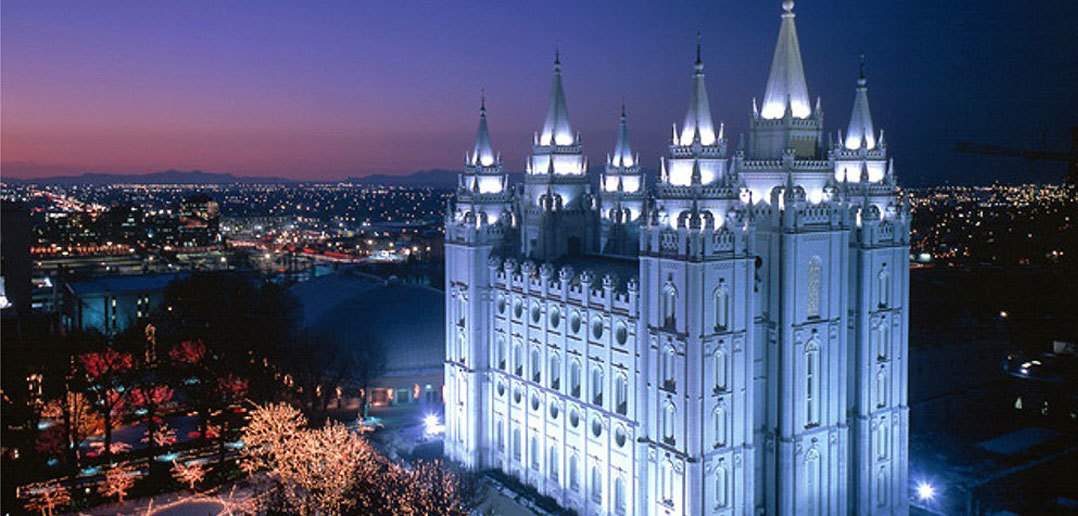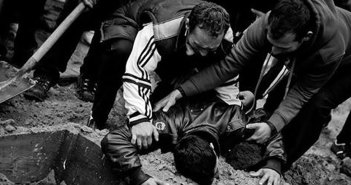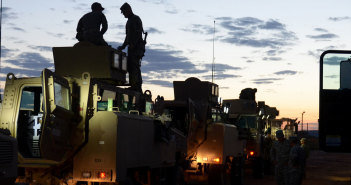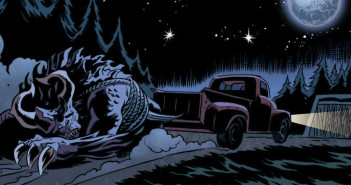As the sun set in Riverside, California, on Election Day 2008, Matthew Lawrence anxiously watched as the presidential election returns came in. Trying his best to relax, the 28-year-old Lawrence reclined on his second-story apartment balcony while numbing his nerves with cigarettes and screwdrivers. Time seemed to stand still until a reporter on his 52-inch TV panel delivered the news: the election had been called for Barack Obama, who would be the 44th president of the United States. “It was a beautiful and powerful moment,” he said.
Alas, Lawrence’s unadulterated joy was to be short-lived. He later learned that Proposition 8, which amended California’s constitution to ban same-sex marriage, had passed in a close vote of 52 to 48 percent. But Prop 8’s success held an even deeper significance in Lawrence’s life. His father, Gary Lawrence, is a devout and deeply conservative Mormon who led the grassroots campaign in California to ensure the initiative’s success. The Church of Jesus Christ of Latter-day Saints (LDS), whose members comprise only a small percentage of California voters, is estimated to have donated at least twenty million dollars to the Yes on 8 campaign. What’s more, the Mormon Church’s social and financial machinations against the gay community in California last year are only the most recent example of the church’s ongoing assault on the cause of GLBT equality. In the end, Prop 8 is but one chapter in the LDS persecution of the homosexual community.
For Matthew Lawrence’s part, the dichotomy between his sexual orientation and his Mormon upbringing proved to be a constant battle. Broadly speaking, the choice of living as a Mormon or as an honest gay man is a titanic struggle that every homosexual LDS member must confront. It is this struggle rather than the political battle in California that I want to explore in this essay. To elucidate the stringent socialization process of young Mormons and the crisis to which it inevitably gives rise when a youth discovers that he or she is gay, let me introduce several individuals that experienced this process and this crisis—and the painful response of the Mormon hierarchy when the person’s struggle came to light. To understand the mental, emotional, and physical struggle of an adolescent trying to come to terms with his or her sexual identify while also striving to live a Mormon life, one only needs to listen to the stories of those who have endured it.
MATTHEW LAWRENCE
Growing up in Santa Ana, California, the Mormon Church was everything to Matthew Lawrence and his family. Mormonism was founded in 1830 by Joseph Smith, who claimed to have unearthed a set of golden plates under the guidance of the angel Moroni. While all Christian denominations have their idiosyncrasies, Mormonism has drawn constant attention since its creation, its doctrine accused of heresy and its founder branded a fraud and a huckster. Smith developed and preached these doctrines upon translating the golden plates using an enchanted “seer stone.” His claims were eclectic and radical: that pilgrims from Jerusalem had traveled to America by boat under the guidance of God in search of the “New Jerusalem”; that Native Americans were the cursed descendants of a corrupt ancient tribe; that the Garden of Eden originally existed in Missouri, where Christ would appear upon his Second Coming.
Those were the dogmas that Lawrence had been taught since birth. Constant participation in religious activities was important for him and his three sisters, as their father was a Mormon bishop. During high school, he attended early morning seminary, a form of Bible study that focuses on the LDS religious system. The class was taught by his father, which put extra pressure on the younger Lawrence to tow the line. The pressure of his Mormon upbringing took a new turn when Lawrence began to realize that he was “different”: he began developing crushes on his male friends. Frightened, he insulated himself in the church. But these walls offered no shelter, as the Mormon religion holds the unwavering view that homosexuality is the sinful choice of an unhealthy mind.
Mormonism’s patriarchical family hierarchy is the culprit in leaving little room for gay LDS members. As in other monotheistic religions, the Mormon Church’s priestly duties are carried out by men. But the Mormon priesthood is far more ubiquitous, as all righteous men are considered priests in the LDS faith, a process of initiation that begins at age twelve. As boys grow up and begin to have families of their own, they’re expected to be both the physical and spiritual leaders of their families, possessing a direct connection to God. Because of this connection God, the family patriarch’s word is final and absolute. Women are excluded from the priesthood, as were black men until 1978—as are gay people today. In accord with Mormon law, a man who’s caught engaging in sexual activity with another man is cast out of the church. Fear that this would happen mounted in Lawrence, who believed he was fighting for his immortal soul. And the battle wasn’t going well: “[I was] taught that God won’t give us more than we can handle, but I was reaching my breaking point.”
Lawrence’s troubles escalated at age fifteen, when his father caught him kissing another boy. Soon thereafter, he was chauffeured to three different counselors in rapid succession. Hoping to discover a curable illness, Lawrence’s parents poured thousands of dollars into therapists who were themselves “recovered” homosexuals. Pharmaceutical treatments were also used. “I had all sorts of chemicals pumped into me: Ritalin, Depakote, Paxil, Lithium, and others I don’t even remember,” he said.
Lawrence’s home life turned into a prison sentence. He was only allowed to leave for school; a security alarm was installed, windows were magnetically locked, and an intercom system was installed. At night, his father even patrolled the house. “I was a rat in a cage.” But the lockdown only encouraged his attempted escapes, as did his parents’ punishments. He was eventually shipped off one night to Salt Lake City, where he was supposed to stay with relatives until further notice. The drastic move was a shock, one that left the confused teen “listless and dazed.” He lost fifteen pounds after only a few weeks of that, and was also forced to sleep in a back room with no heating for months.
The exile ended after a year, and Lawrence returned to California to graduate from high school. He even invited a boy to his prom. Later, he studied geography at California State University at Fullerton and now enjoys a career as a certified GIS technician and lives on his own. His relationship with his family is strained, as is his faith. Disillusioned with Mormonism, he no longer practices it; to do so would be a form of emotional masochism. He describes his current state as one of “religious limbo.”
CLARK JOHNSEN
An intense Mormon upbringing is something Clark Johnsen shared in common with Matthew Lawrence. Born in Los Angeles, Johnsen, now 32, moved around a lot when growing up, spending time in Wyoming, Illinois, and Texas. Faith in the Mormon Church was the glue that held the family together: his father was a bishop and his mother a ward president of the Relief Society. Johnsen had homosexual feelings from an early age, which he lied about to avoid hurting his family or his own spiritual well-being. “I viewed gay people as very lost and sinful, so I didn’t think I could ever be one and also be a happy and fulfilled person,” he said. He was willing to do whatever he had to do in order to remain in the church and serve the priesthood, even if it meant marrying a woman. But at age sixteen, he faced himself down in the mirror and admitted to himself that he was gay. Still, nothing changed, and he remained adamant about maintaining a Mormon lifestyle.
As his high school graduation neared, Johnsen discovered a local gay organization and attended a meeting. While there, he met a young man with whom he began a romance. However, he avoided sexual contact, as this is something the Mormon Church treats with urgent seriousness. “In order to keep young men and women chaste, the church teaches children that sexuality is something to be feared and ashamed of. Sexual sin is likened in its seriousness to murder.” Later, when questioned by his bishop, Johnsen admitted he was gay. The shocked bishop instructed him to seek counsel with his parents, who responded with predictable distress. But because the boy’s chastity was intact, the bishop was hopeful that the situation could be corrected, a process that would begin with an education at Brigham Young University.
As a student at BYU he was subject to the university’s Honor Code, which enforced a strict system of sexual conduct, including a ban on homosexuality. Even a rumor of a violation could trigger a review by the Honor Code Office, which Johnsen described a “a modern-day Gestapo.” He was questioned by the office on several occasions due to reports that he’d had dates with men. But because he never broke the law of chastity, he was never expelled. He was removed from student activities, however.
In mid-2007, Johnsen began taking a hard look at his Mormon faith. Now a fully mature and independent adult living in New York City, he has accepted himself and no longer practices Mormonism. In order to move on with his life, he either had to obey the church or his own integrity. “Do I believe myself, or do I believe the church? My journey is mine,” he observed.
TROY WILLIAMS
Not only did Troy Williams decide to live openly and honest, he relishes the opportunities his sexuality has given him. While the idea of homosexuality was scary for Williams when he was a child, the 38-year-old Williams feels that despite the spiritual hurdles he has had to jump through, being a gay man actually saved him “from being average.”
Currently working as the public affairs director of KRCL Radio in Salt Lake City, Utah, Williams struggled as a gay Mormon youth. The fear of rejection haunted him. “I was properly socialized. When I was in love with my high school best friend, I successfully stuffed [my feelings]down deep; I bought into the Mormon idea that there was no such thing as a gay person, only gay behavior.” Like both Lawrence and Johnsen, Williams grew up in a family whose lives revolved around Mormonism, forcing him to choose between loyalty to the church or to his own nature. In this case, the church initially won.
When Williams turned 32, he told his family that he was gay. “It was hard for them. Parents have their own ‘coming out’ process to go through,” he noted. Despite their initial shock, he now has a solid relationship with them. His sister, eight years his senior, has also left the church and is very close to Williams. But his brother, ten years older, is still a proud Mormon and has not spoken to Williams for thirteen years.
As a creative individual, Williams used his passion for filmmaking to explore his sexual tensions in a short film entitled “Mormon Erotica” (available on YouTube). Making the film helped him to explore his own feelings and ultimately come to terms with his identity. His inquisitiveness led him to explore church claims that were passed off as facts. After objective study and research, he came to regard Mormonism as essentially a “huge corporation” and the religion’s followers as salesmen.
Organized religion no longer plays a part in Williams’ life, and he’s had his name removed from the church’s records. He has since become a successful radio personality in Utah as well as a graduate of the University of Utah, a playwright, and a columnist. He believes his sexuality played a role in his success: “Being queer [gave me]ultimate freedom. [I’m] free from gender limitations and traditional family obligations. As a result, I am less judgmental, less fearful, and I have cultivated a greater respect for all people.”
CAROLYN BALL
Summoned to the “Court of Love,” Carolyn Ball stood before a chamber of seven Mormon officials while brazen questions were lobbed at her: Had she been intimate with another woman? Did she and the other woman wear clothing while together? What were her thoughts during the encounter? After answering the probing questions, Ball’s verdict was delivered. Because of her sexual activity with another woman, she was to be disfellowshipped, which forbade her from praying in a Mormon chapel, participating in adult Sunday school, or partaking of the sacrament. She was, however, still permitted to pay her church tithe.
Following this humiliating experience, Ball’s bishop advised her never again to associate with anyone homosexual and to read The Miracle of Forgiveness, by Spencer W. Kimball, the twelfth president of the Mormon Church. But she didn’t find help or consolation in the book, and came across a passage that particularly stung: “Homosexual sin was one of the greatest sins and next to the sin of murder.” Confused and depressed, Ball began to view her life as akin to that of a killer, prompting her eventually to leave her home in Provo, Utah. “This was a horrible time in my life. I made some poor decisions personally and then finally moved to Salt Lake City.”
Ball, now 44, never thought that her life would change so much from childhood. While growing up, she lived in a house where the Mormon Church defined her world. She disciplined herself day and night to live by all the Mormon tenets. She was active in church programs, studied scripture, believed in Joseph Smith, and even avoided R-rated movies. “I felt I had a strong testimony of the church and I wanted to live its principles to the fullest.” But all her attempts at Mormon purity could not suppress her attraction to women, which caused Ball to bury her feelings. She wanted nothing more than the normality of a husband and children as expected of all Mormon women, whose duty it is to serve their husbands and children without question. While contemporary Mormon women regularly attend college and pursue careers, the importance of raising a family is still supposed to be their chief responsibility.
Ball knew all this; it’s what she wanted. Following high school, she attended BYU, where she regularly dated men. While she enjoyed their company, she knew her feelings would never go beyond friendship. Nevertheless, she would be engaged to men twelve times and marry twice before giving up this heartfelt goal. “[In] the first marriage, the man was gay, and we never personally talked about it. The second marriage was consummated; on the honeymoon night I cried and sobbed in the bathroom.” She buried herself in work and volunteered her time as much as possible, which led to physical and mental exhaustion. The end of denial finally occurred when Ball came out to her family at age 36. “My mother was very accepting. My father accepts me for who I am, but he doesn’t think gay or lesbian relationships are ‘real.’” Of Ball’s four sisters and one brother, only one sister doesn’t accept the truth and refuses to admit Ball into her home.
Despite her honestly, the Court of Love’s verdict haunted Ball even after she moved from Salt Lake City to Missouri. Hoping to worship peacefully in a Mormon chapel, she volunteered as an interpreter for deaf church-goers because of her fluency in sign language. This position was granted but shortly taken away after her new bishop learned of her sexuality. Interpretation was assigned to someone with no training in sign language, and Ball was ordered never again to bother the bishop’s ward.
Ball was eventually called before Missouri’s Stake President for a final judgment of total excommunication. Though her encounter with the president was pleasant enough, he told her that if she didn’t end her lesbian lifestyle, the church would excommunicate her. Ball chose her life over the church. “I was no longer lying to myself and those around me. I had made the last step to being honest with everyone.”
PATRICIA HARDAWAY
The ultimate importance of the Mormon duty to marry and raise a family was a weight that Patricia Hardaway was likewise expected to bear. Hardaway’s parents were Swedish immigrants who moved to Salt Lake City for the Mormon Church. Hardaway, her sister, and her brother were raised by strict Mormon principles, as their father was a Stake Patriarch. “He was asked to speak wherever he went; he was quite the charismatic speaker,” she said. Marrying her high school sweetheart, Hardaway had strong feelings for her husband, as the two had long been best friends. But her emotions were not whole: “I knew that I didn’t feel about him the way I should feel about someone I [married].”
Hardaway sensed that she could only be happy with another woman, though it took her years to admit the truth. She began having secret relationships with other women but never considered herself a lesbian. She only thought that she was susceptible to weakness and sin. “I was very conflicted and had to make a choice: I chose the church.” She sometimes felt pained that her wedding vows were so empty, even when she and her husband decided to adopt four children, a boy and three girls. The adoptions caused further denial, though she still had relationships with women while married.
When Hardaway turned forty, her trust in the Mormon Church began to be shaken, but not because of her sexuality. Memories began to surface of sexual abuse she had suffered at her father’s hand. “Because of the abuse by my father, I lost all trust in the priesthood.” Feeling betrayed, she left the church, allowing her to begin to accept her sexuality. She discovered various message boards and chat rooms that catered to married and formerly married lesbians. Reading stories that mirrored her life, Hardaway knew she was changed forever.
Hardaway’s double life ended when she told her family the truth. Knowing that the revelation would turn everyone’s life upside down, she was determined not to be the victim of fear and shame any longer. Her husband had a difficult time accepting the truth, but their longtime friendship helped ease the situation. Because her children were still young, they accepted their mother’s departure from church norms. Her parents, however, were greatly dismayed. On his deathbed, Hardaway’s father disowned her despite his past abuses, and her sister won’t speak to her to this day. Her mother makes an effort to understand her life choices.
Despite the hardships, peace fell over Hardaway after facing reality. “I felt a calm I have never known, and I am proud to be who I am,” she said. Now a licensed massage therapist, the 56-year-old woman has been in a relationship with her partner for eleven years. Her mother is still gracious and all of her children have left the church. “My kids have been freed to be independent thinkers, rather than trying to fit into a mold.”
PROPOSITION 8
Of the Mormon Church’s involvement in oppressing the gay community, Clark Johnsen doesn’t believe it was wholly a religious act, feeling there was something much more cynical at play. “Most churches in the Bible Belt think Mormonism is a sham and a cult. It makes me think that [Mormon] leaders had other motives, perhaps to change [the church’s]image.” He worries that because the Mormon Church has been striving for decades to find acceptance by the mainstream religious Right, the gay community was used as a whipping boy. Johnsen further worries that the power of the churches in general is growing too great in the U.S. and that religious organizations on the whole hurts people. “To pretend that morality could not exist without faith in ancient texts is just silly,” Johnsen said.
Religion’s ability to influence large voting blocks against a minority was proven in California, further affirming the importance of a secular government that does not act as the agent of any one church. Carolyn Ball believes that the Mormon Church should invest its time and treasure in an effort to help people instead of undermining some groups. “So much money was spent on preventing gay marriage, but what about starving children? What about helping women whose husbands have died in war?” she asked.
Understanding both the Mormon Church and the homosexual community on the west coast, Troy Williams questions whether Proposition 8 would have even passed if it hadn’t been for the vast resources the church invested. He also feels that Mormons themselves have little credibility concerning marriage. While the official LDS movement rejects polygamy, historically they promoted it and only foreswore polygamy in exchange for Utah’s statehood. He also notes that even though most Mormons no longer practices polygamy in this life, it’s a reward in the afterlife. “The irony of a church that still believes in post-mortal polygamy pushing a constitutional amendment is infuriating.”
Though he’s only 29, Matthew Lawrence reflects heavily on his childhood. He’s now an agnostic, but his family is still strong in the church. “Being Mormon, gay, and a teen was a horrible culmination of factors that brought about a miserable and confused adolescence.” But despite his past, Lawrence is ultimately interested in moving forward. He’s neither ashamed nor proud of his sexuality; it’s an aspect of his life that he didn’t choose and can’t change, and he’s going to live his life as a whole person without fear, denial, or regret. “I’ve reached equilibrium with my sexuality; I am who I am. I believe that if you’re comfortable with yourself, that’s when you’re a true success.”
This article originally appeared in the Gay & Lesbian Review. To view the PDF version of the piece’s original publication, please click here.




